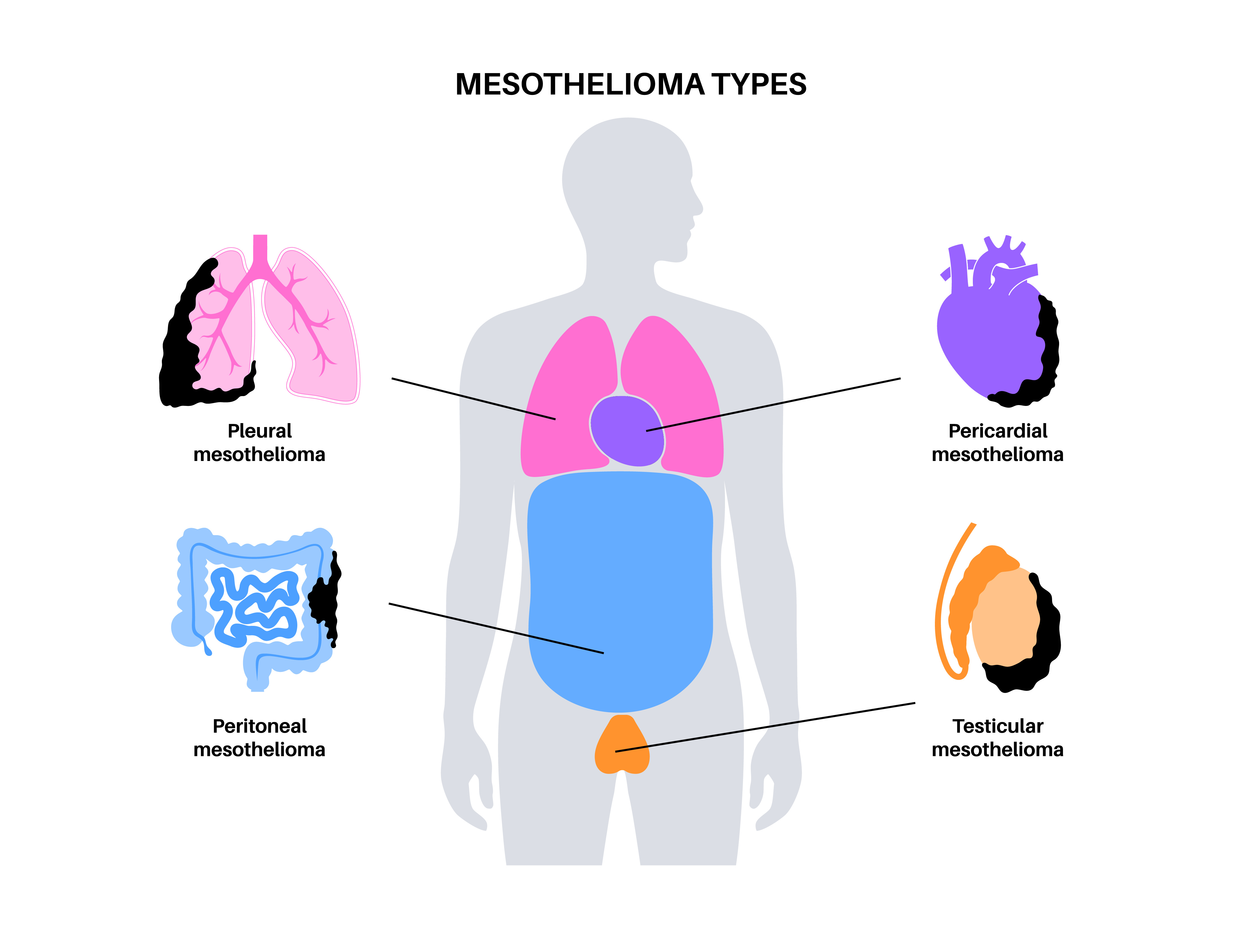
A mesothelioma diagnosis can be overwhelming, leaving patients and their families grappling with difficult decisions. As you navigate this challenging time, understanding the specific type of this rare cancer is crucial for determining the right course of action. Whether you're dealing with pleural, peritoneal, pericardial, or testicular mesothelioma, identifying the condition correctly not only guides treatment options but can also significantly influence the legal avenues available for seeking compensation. Let’s explore the types of mesothelioma and outline the key legal steps that can help secure the support you need.
Understanding The Types of Mesothelioma
Mesothelioma is an aggressive cancer most commonly linked to asbestos exposure. However, it is not a one-size-fits-all disease. There are four primary types of mesothelioma, each affecting different areas of the body and presenting unique symptoms and prognoses:
- Pleural Mesothelioma: The most common type, affecting the lining of the lungs (pleura). Symptoms often include chest pain, persistent cough, and difficulty breathing.
- Peritoneal Mesothelioma: Occurs in the lining of the abdomen (peritoneum), leading to abdominal pain, bloating, and weight loss.
- Pericardial Mesothelioma: A rare form that impacts the lining around the heart (pericardium). Patients may experience heart palpitations, chest pain, and shortness of breath.
- Testicular Mesothelioma: The rarest type, affecting the lining of the testes. Symptoms include swelling or lumps in the scrotum.
Recognizing the specific type of mesothelioma is essential for tailoring treatment strategies that can improve outcomes. This identification is also pivotal when pursuing legal claims, as the type and location of mesothelioma can influence the eligibility for certain types of compensation.
How Identifying Your Mesothelioma Type Influences Treatment
Accurate diagnosis plays a significant role in shaping treatment plans. For instance, pleural mesothelioma may require a combination of surgery, chemotherapy, and radiation, while peritoneal mesothelioma could be treated with procedures like cytoreductive surgery paired with heated intraperitoneal chemotherapy (HIPEC). The chosen path depends heavily on the cancer’s location, stage, and how well it responds to initial treatments.
In recent years, advancements in immunotherapy and targeted treatments have shown promise for certain types of mesothelioma, providing patients with more personalized care options. Understanding these treatment nuances not only enhances patient survival rates but also informs the timing and nature of legal actions. Legal cases often need to factor in medical schedules, and your diagnosis can determine the best period to file claims or pursue settlements.
Legal Steps for Mesothelioma Patients
After receiving a mesothelioma diagnosis, taking swift legal action can make a substantial difference in securing compensation to cover medical expenses, lost wages, and more. Here are key steps to consider:
- Understand Statute of Limitations: Each state imposes time limits on filing mesothelioma claims. Generally, patients have between one and three years from diagnosis to initiate legal proceedings. Early consultation with a specialized attorney ensures you don’t miss critical deadlines.
- Identify Potential Compensation Sources: Compensation may come from various sources, including asbestos trust funds, lawsuits against negligent companies, and VA benefits for veterans. The type of mesothelioma may affect which compensation sources apply.
- Seek Expert Legal Guidance: Mesothelioma cases are complex, requiring legal professionals with in-depth knowledge of asbestos laws. Experienced attorneys can navigate these intricacies, help gather necessary evidence, and secure the maximum compensation possible.
Financial Compensation and Settlements
One of the most important aspects of mesothelioma claims is determining the potential compensation. Settlements can vary widely, depending on factors like the severity of your illness, types of mesothelioma, and the strength of your case. On average, mesothelioma settlements can range from hundreds of thousands to millions of dollars. Trust fund claims, which involve compensation from bankrupt asbestos companies, are another significant source. These funds are often quicker to access but might offer lower compensation than lawsuits.
Understanding the different avenues for compensation, from personal injury claims to wrongful death lawsuits, ensures that patients and families receive the financial support they deserve. Additionally, each path has specific procedures and documentation requirements, which makes working with a seasoned legal team even more vital.
Mesothelioma and the Military: A Critical Connection
For veterans and military personnel, mesothelioma is a particularly concerning issue due to widespread asbestos use in military equipment, barracks, and ships from the 1930s through the late 1970s. Navy veterans are among the most affected, as asbestos was heavily used in shipbuilding and maintenance, often exposing sailors to asbestos fibers in confined spaces.

Veterans diagnosed with mesothelioma may be entitled to additional compensation through VA benefits, which can be pursued alongside personal injury claims. Understanding your exposure history, whether through shipyards, military housing, or other service-related environments, is essential for building a strong legal case. Cooney & Conway has extensive experience helping veterans navigate both VA claims and other compensation sources to ensure they receive the support they deserve.
Why Cooney and Conway is Your Trusted Partner in Mesothelioma Claims
At Cooney and Conway, we understand the emotional and financial toll of a mesothelioma diagnosis. Our experienced legal team has successfully represented thousands of clients with different types of mesothelioma, ensuring they receive the compensation they deserve. From guiding you through each step of the legal process to advocating for your best interests, our firm is committed to providing compassionate, expert support. Don’t face this challenge alone—reach out today for a free case evaluation.